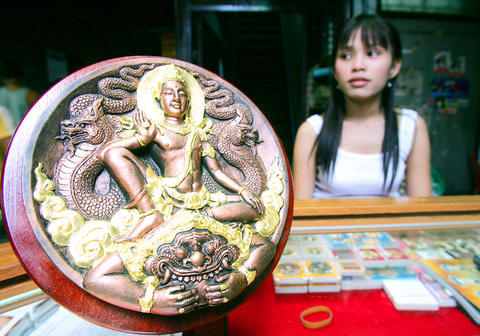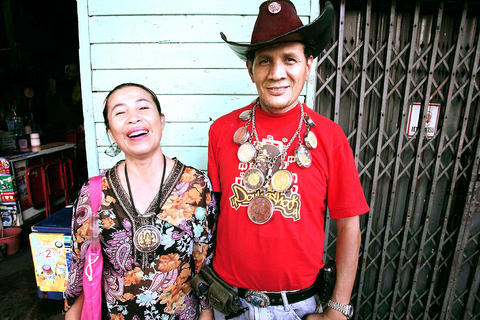They can cost a small fortune, resemble '80s disco jewelry, and are arguably un-Buddhist, but many Thais seeking psychic insurance in troubled times are snapping up so-called Jatukam Ramathep amulets, coin-shaped talismans with supposed magical powers.
The Jatukam amulets, coveted by millions of people in Thailand -- and available on eBay for those living elsewhere -- have become big business, as believers, collectors and speculators drive a thriving market. Rare ones reportedly command prices of more than 1 million baht (US$30,000).
The amulet craze has also led to robberies and at least one death, when a crowd stampeded for the opportunity to get a limited edition.

PHOTO: AP
As Thailand muddles through political insecurity and nervousness about the economy, people are more openly grasping at supernatural aids. The fad vividly illustrates how belief in astrology, the occult and animism remain a major part of a modern, industrialized Thailand.
The amulets are typically the size of a silver dollar, and come in a variety of materials, including bronze, silver and clay.
Prices depend on the materials used, the circumstances under which they were anointed -- some were recently taken aloft on a jetliner to be blessed by monks -- and how rare the model is.

PHOTO: AP
It is not unusual for them to be encased in a gold frame hanging from a heavy link chain around the neck and worn outside the shirt -- an awkward fashion statement, at best.
Many Thais carry or wear amulets, usually small ones depicting images associated with Buddhism, the religion of most Thais, though amulets are not formally part of its doctrine.
Most amulet owners are fairly discreet, wearing them under shirts and blouses. Serious believers carry more than one and as many as a dozen, though such ostentatiousness is usually associated with policemen and criminals -- who understandably seek all the protection they can get.
But Jatukam amulets are everywhere; affluent businessmen, political protesters, teachers in the insurgency-wrecked south, curbside food vendors, all wear them proudly with the shared hope that they will ward off danger and attract good fortune.
"I was in a number of car accidents before. Once I started putting these amulets in my taxis and around my neck, my car has been safe no matter how many hours I am on the road each day and how tired I am," said Surasak Mansee, a Bangkok taxi driver, who has three amulets draped on his rearview mirror and two more around his neck.
"I don't know what you think, but my wife has also won some lotteries and we are happier than ever," he said.
"People turn to superstition when they feel that religion and other social as well as judicial systems are no longer providing them the security and justice they need," said respected archeologist Srisak Vallibhotama. "It's a reflection of the kind of society we live in."
Although Buddhism promotes achieving inner peace through detachment from desires, many Thais who profess themselves adherents practice a spirituality that targets material gain as much as inner tranquility.
Different variations of the Jatukam amulet focus on the promise of wealth and prosperity, such as the "Super Rich," "Immediately Rich," "Rich Without Reason" and "Miracle Rich" models.
"The names are as important as how they are made and promoted. The producers know what the demands are and they have to match those demands. People want protection and people want wealth," said Niti Pawakapan, an anthropologist at Bangkok's Chulalongkorn University.
Jatukam Ramathep amulets were named after a legendary warrior prince of an ancient southern Thai kingdom who is usually depicted on the talisman in a seated position. The original batch was made in the southern province of Nakhon Si Thammarat in 1987 to raise funds to build a new city pillar, which marks the founding site of a city.
These originals were priced at less than 50 baht (then worth US$2) each when they came out. Now, they can fetch more than 100,000 baht (US$3,200), according to vendors.
The Jatukam amulets became a true nationwide phenomenon after their original creator, Police Major General Khunphantarak Rajadej, died at the age of 104 last year -- a time which also saw political turmoil that led to the country's first coup in 15 years.
Khunphantarak, a respected law enforcement officer, was also believed to possess knowledge of the occult. Thousands of people attended his funeral in February, drawing such a crowd in part because it was an auspicious occasion to acquire the amulets.
Since then, distribution of the amulets has often been chaotic.
In April, a crowd waiting to buy the amulets in Nakhon Si Thammarat, 580km south of Bangkok, erupted into a stampede that left one woman dead and dozens of others injured. More than 10,000 people had camped overnight outside a school for the amulets.
Prudent buyers can order from mail order catalogs that otherwise offer mundane household goods such as brooms, baby food and electrical appliances.
Despite their dubious religious merit, many temples and schools have produced the amulets to raise funds for charitable causes.
But at least one well-known monk derides the fad.
Phra Payom Kalayano, a temple abbot in Nonthaburi, made chocolate cookies that resembled the amulets and called them "Four bites." Stamped on them are four of the Buddha's teachings on how to become wealthy.
"I want to remind people that becoming rich is about discipline and hard work, not magical amulets. If it is really magical, why would the monks share it with you and not keep it to themselves and make money for the temples?" he said.

MAKING WAVES: China’s maritime militia could become a nontraditional threat in war, clogging up shipping lanes to prevent US or Japanese intervention, a report said About 1,900 Chinese ships flying flags of convenience and fishing vessels that participated in China’s military exercises around Taiwan last month and in January last year have been listed for monitoring, Coast Guard Administration (CGA) Deputy Director-General Hsieh Ching-chin (謝慶欽) said yesterday. Following amendments to the Commercial Port Act (商港法) and the Law of Ships (船舶法) last month, the CGA can designate possible berthing areas or deny ports of call for vessels suspected of loitering around areas where undersea cables can be accessed, Oceans Affairs Council Minister Kuan Bi-ling (管碧玲) said. The list of suspected ships, originally 300, had risen to about

DAREDEVIL: Honnold said it had always been a dream of his to climb Taipei 101, while a Netflix producer said the skyscraper was ‘a real icon of this country’ US climber Alex Honnold yesterday took on Taiwan’s tallest building, becoming the first person to scale Taipei 101 without a rope, harness or safety net. Hundreds of spectators gathered at the base of the 101-story skyscraper to watch Honnold, 40, embark on his daredevil feat, which was also broadcast live on Netflix. Dressed in a red T-shirt and yellow custom-made climbing shoes, Honnold swiftly moved up the southeast face of the glass and steel building. At one point, he stepped onto a platform midway up to wave down at fans and onlookers who were taking photos. People watching from inside

Japan’s strategic alliance with the US would collapse if Tokyo were to turn away from a conflict in Taiwan, Japanese Prime Minister Sanae Takaichi said yesterday, but distanced herself from previous comments that suggested a possible military response in such an event. Takaichi expressed her latest views on a nationally broadcast TV program late on Monday, where an opposition party leader criticized her for igniting tensions with China with the earlier remarks. Ties between Japan and China have sunk to the worst level in years after Takaichi said in November that a hypothetical Chinese attack on Taiwan could bring about a Japanese

STREAMLINED: The dedicated funding would allow the US to transfer equipment to Taiwan when needed and order upgraded replacements for stockpiles, a source said The US House of Representatives on Thursday passed a defense appropriations bill totaling US$838.7 billion, of which US$1 billion is to be allocated to reinforcing security cooperation with Taiwan and US$150 million to replace defense articles provided to the nation. These are part of the Consolidated Appropriation Act, which the US House yesterday passed with 341 votes in favor and 88 against. The act must be passed by the US Senate before Friday next week to avoid another government shutdown. The US House Committee on Appropriations on Monday unveiled the act, saying that it allocates US$1 billion for the Taiwan Security Cooperation Initiative